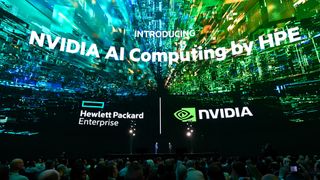HPE’s drive for enterprise AI dominance continues with new Nvidia partnership
Nvidia AI computing by HPE brings a slew of new AI products to market

Hewlett Packard Enterprise (HPE) and chipmaker Nvidia have entered into a new alliance to bring AI-focused products to the data center and the cloud.
Dubbed Nvidia AI Computing by HPE, it comprises several elements, of which the jewel in the crown is HPE Private Cloud AI.
HPE Private Cloud AI was revealed during CEO Antonio Neri’s opening keynote at HPE Discover as “a turnkey private cloud for AI that will enable enterprises to focus their resources on developing new AI use cases that can boost productivity and unlock new revenue streams”.
Nvidia CEO Jensen Huang, who joined Neri on stage for the announcement, added: “Generative AI and accelerated computing are fueling a fundamental transformation as every industry races to join the industrial revolution.”
While HPE has existing products in the market featuring Nvidia technology, this is a much tighter integration, Huang said, “combining the entire Nvidia AI computing stack along with HPE’s private cloud technology”.
In terms of features, HPE Private Cloud AI is founded on Nvidia AI Enterprise software platform, which streamlines the development and deployment of Copilots and other generative AI applications in the enterprise.
Nvidia AI Enterprise also includes Nvidia NIM, which delivers inference microservices that are optimized for AI model inferencing. According to the firms, this can “smooth the transition of AI models from prototype to secure deployment “in a variety of use cases” – although no examples of those use cases have been given as yet.
Cloud Pro Newsletter
Stay up to date with the latest news and analysis from the world of cloud computing with our twice-weekly newsletter
In addition to the Nvidia AI Enterprise platform, HPE Private Cloud AI also includes HPE AI Essentials software, which provides a ready-to-run set of AI and data foundation tools. These can be managed through a unified control plane and in combination, the company claims, “provide adaptable solutions, ongoing enterprise support, and trusted AI services, such as data and model compliance”.
When it comes to the underlying hardware, the product delivers what the company describes as a “fully integrated AI infrastructure stack” that comprises HPE ProLiant servers with support for Nvidia L40S, Nvidia H100 NVL Tensor Core GPUs and the Nvidia GH200 NVL2 platform, Nvidia Spectrum-X™ Ethernet networking, and HPE GreenLake for File Storage.
Speaking to the press ahead of the launch, HPE CTO Fidelma Russo said: “Nvidia and HPE didn't just want to bring Nvidia and HPE technologies together into a solution but we wanted to deliver an experience that would truly accelerate time to value for an enterprise adopting generative AI.”
She continued: “Unlike other solutions that are services led, private cloud AI is ready to run out of the box. You plug it in, you connect it to the GreenLake cloud and three clicks later, boom. Your Data Science and IT operations teams are up and running the Nvidia software stack. In addition, we deliver an evergreen experience so you are always guaranteed to have the latest HPE software in Nvidia AI enterprise software and new software.”
According to Russo, the product can increase the productivity of data engineers, data scientists, and IT operations teams by up to 90%.
OpsRamp, which has been subsumed into HPE GreenLake following its acquisition in March 2023 and is considered by the company to be at the core of its AI ambitions, also has a role in HPE’s latest AI play. It provides observability for the Nvidia end-to-end computing stack that forms the core of HPE Private Cloud AI.
The announcement of Nvidia AI Computing by HPE follows on the heels of last year’s GreenLake for LLMs, but has a far broader customer base. While GreenLake for LLMs is still de facto in the pilot phase, HPE Private Cloud AI will be generally available within a quarter or two.
Speaking to ITPro during the pre-conference press briefing, Neil MacDonald, EVP & GM for compute, HPC and AI at HPE, said the target customer base is “very firmly enterprise customers who are seeking to embrace generative AI and recognize that running AI workloads at scale in the public cloud will crush their IT budgets”.
Also on the HPE Discover 2024 AI menu
Not everything is about the private cloud, however. As mentioned in our preview, much of HPE’s revenue still comes from on-premises solutions and its product announcements also reflect this.
Two of its Gen 12 ProLiant servers – ProLiant DL384 Gen12 and ProLiant DL380a Gen12 – come with AI-focused Nvidia support.
The ProLiant DL384 Gen12 server with Nvidia GH200 NVL2 Grace Hopper superchip is, according to HPE “ideal for LLM consumers using larger models or RAG (retrieval augmented generation)”.
The ProLiant DL380a Gen12, meanwhile, offers support for up to eight Nvidia H200 NVL Tensor Core GPUs. Once again, this product is provided with an eye to customers who are using LLMs and want to scale their generative AI projects.

Make an informed decision on your data center's architecture
Finally, in its HPC category, the HPE Cray XD670 supports eight Nvidia H200 NVL Tensor Core GPUs. While the previous two products are targeted at LLM users, this is aimed at LLM creators.
When it comes to the future, HPE said it will be “time to market to support the Nvidia GB200 NVL72 / NVL2, as well as the new Nvidia Blackwell, Nvidia Rubin, and Nvidia Vera architectures”, as well as “upcoming Nvidia reference architecture storage certification programs”.
All of these products will be generally available this autumn, with the exception of HPE Cray XD670 server with Nvidia H200 NVL, which will be available in the summer.

Jane McCallion is ITPro's Managing Editor, specializing in data centers and enterprise IT infrastructure. Before becoming Managing Editor, she held the role of Deputy Editor and, prior to that, Features Editor, managing a pool of freelance and internal writers, while continuing to specialize in enterprise IT infrastructure, and business strategy.
Prior to joining ITPro, Jane was a freelance business journalist writing as both Jane McCallion and Jane Bordenave for titles such as European CEO, World Finance, and Business Excellence Magazine.



